
Georgia election official says he doesn’t expect results in runoff tomorrow
A second runoff victory for Warnock could once again hinge on Black voter turnout
From CNN’s Nicquel Terry Ellis and Brandon Tensley
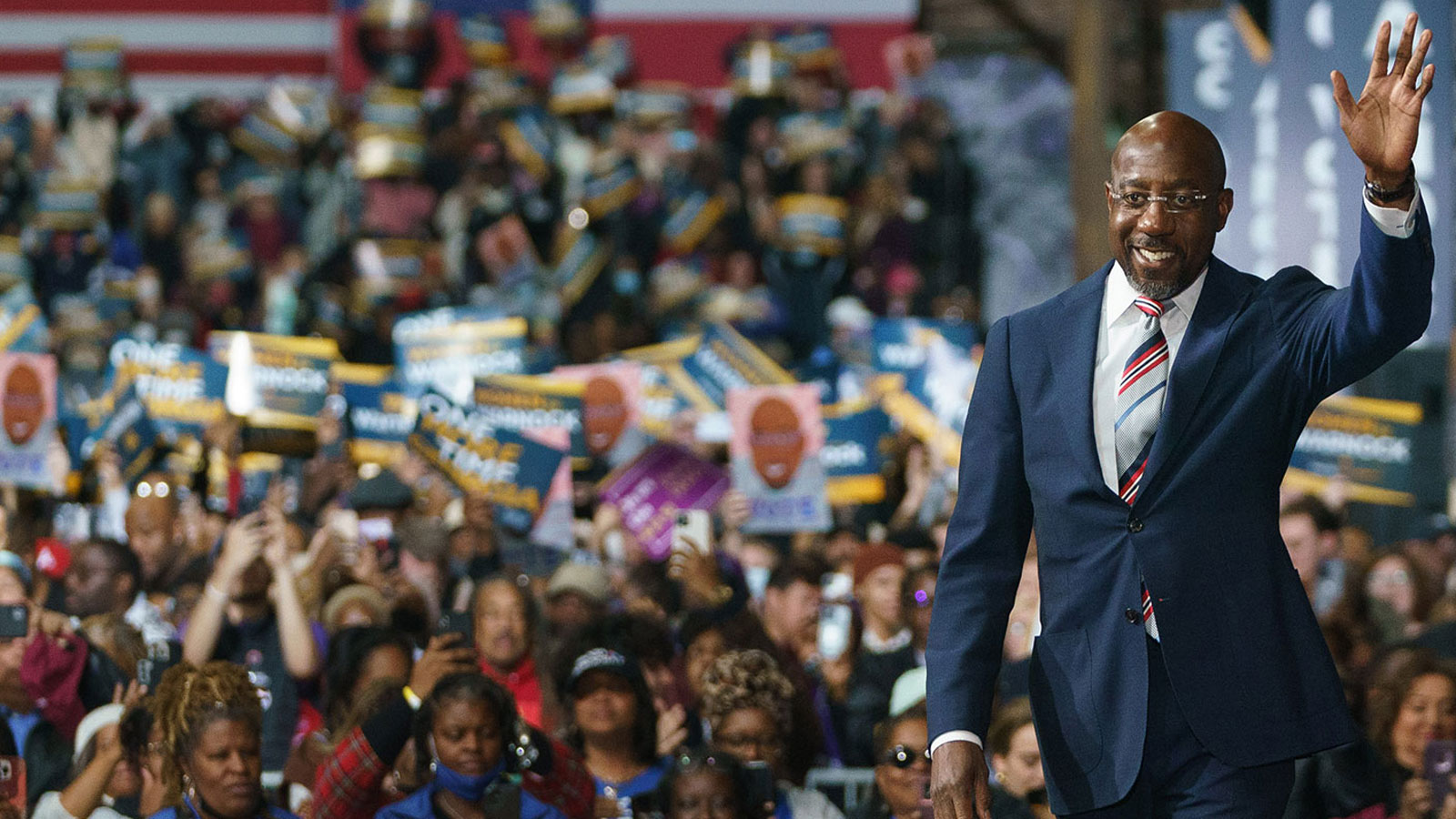
Former UN Ambassador Andrew Young rode his scooter alongside Democratic Sen. Raphael Warnock, Martin Luther King III and a fervent crowd of marchers on a recent Sunday through a southwest Atlanta neighborhood.
The group stopped at an early polling location to vote, forming a line with some waiting as long as one hour to cast their ballots.
At the age of 90, Young says he is selective about public appearances but felt the “Souls to the Polls” event was one where he could motivate Black voters in Tuesday’s hotly contested US Senate runoff between Warnock and Republican challenger Herschel Walker — a historic matchup between two Black men.
Community leaders and political observers say the Black vote has consistently played a pivotal role in high-stakes races for Democrats, including in 2021, when Warnock defeated then-Sen. Kelly Loeffler in a runoff.
A key demographic for Democrats: Black voters likely to cast a ballot are near unanimous in their support for the Democrat (96% Warnock to 3% Walker), according to a CNN poll released last week that showed Warnock with a narrow lead.
A second runoff victory for Warnock could once again hinge on Black voter turnout in a consequential race. If Warnock wins, it would give Democrats a clean Senate majority — one that doesn’t rely on Vice President Kamala Harris’ tie-breaking vote and allows Majority Leader Chuck Schumer more control of key committees and some slack in potentially divisive judicial and administrative confirmation fights.
Voting, Young said, is the “path to prosperity” for the Black community. He noted that Atlanta’s mass transit system and economic growth have been made possible by voters.
“Where we have voted we have prospered,” Young said.
The rally led by Young, King and Warnock seems to have set the tone for many Black voters in Georgia. Early voting surged across the state last week with long lines reported across the greater Atlanta area.
Early voting numbers look promising: As of Sunday, more than 1.85 million votes had already been cast, with Black voters accounting for nearly 32% of the turnout, according to the Georgia Secretary of State’s Office. The early voting period, which was significantly condensed from 2021, ended on Friday.
Billy Honor, director of organizing for the New Georgia Project Action Fund, said the Black turnout so far looks promising for Democrats.
“When we get Black voter turnout in any election statewide that’s between 31 and 33%, that’s usually good for Democrats,” Honor said. “If it’s between 27 and 30%, that’s usually good for Republicans.”
Honor added: “This has an impact on elections because we know that if you’re a Democratic candidate, the coalition you have to put together is a certain amount of college-educated White folks, a certain amount of women overall, as many young people as you can get to turn out – and Black voters. That’s the coalition. (Former president) Barack Obama was able to smash that coalition in 2008 in ways we hadn’t seen.”
Read more here.
How 2022 Georgia midterm voters compare with the state’s previous elections
From CNN’s Christopher Hickey and Nicholas Anastacio
A slightly larger share of White voters and smaller shares of Black, Asian and Latino voters cast their ballots in 2022 compared with Georgia’s previous three midterm elections and runoffs. The share of Black voters was the lowest of any Georgia election since the 2018 midterms.
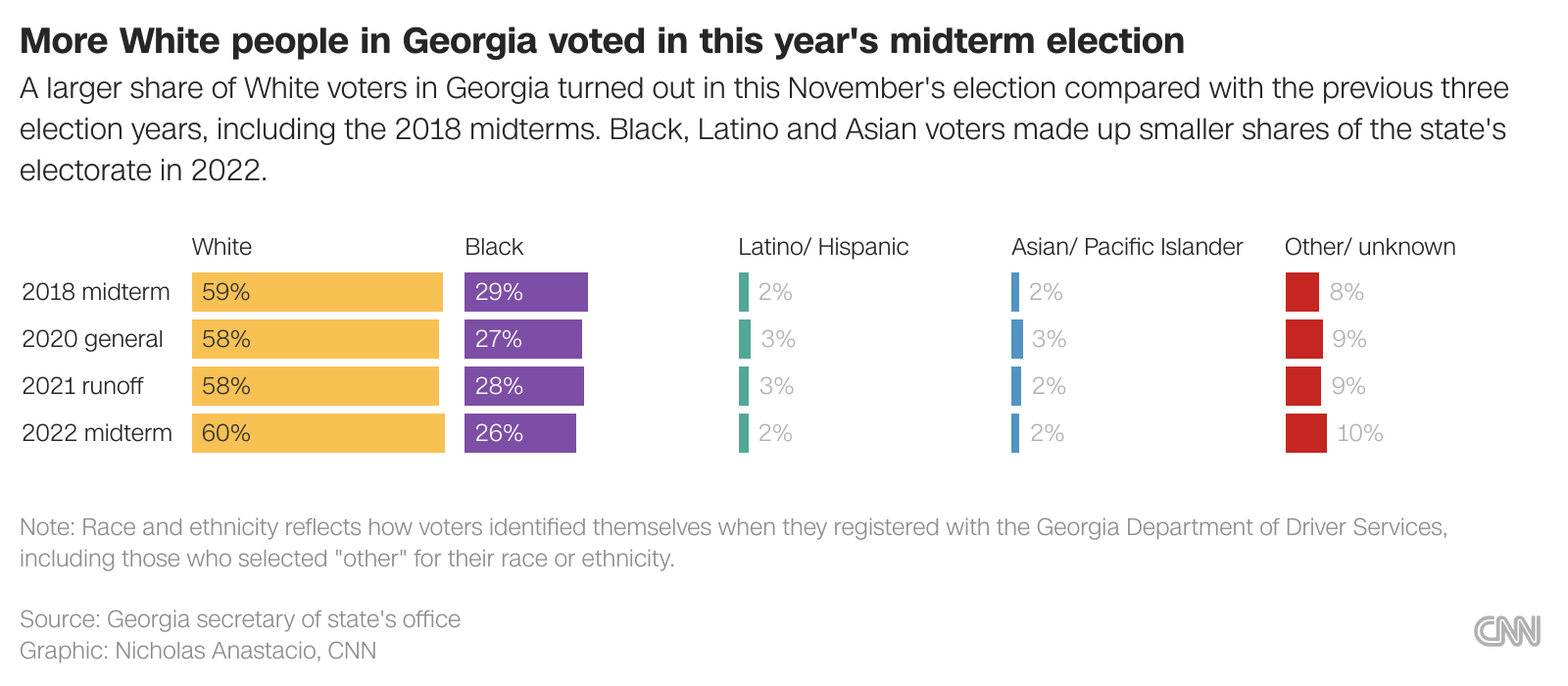
A CNN exit poll from 2021 showed that Democratic Sen. Raphael Warnock won 93% of Black voters in Georgia’s last runoff election, a 6-point improvement from the general election held in November 2020.
Black voters’ share of Georgia’s electorate increased in the 2021 runoff election when Warnock faced Sen. Kelly Loeffler after neither took a majority of the vote in the 2020 general election. Black voters made up 28% of the Georgia electorate in that runoff, slightly higher than their share in the 2020 general election. Black voter turnout was highest when Stacey Abrams, a Democrat, first ran against now-Gov. Brian Kemp, a Republican, for governor in 2018.
Voters in the 2022 midterms were also older. Georgians over 50 represented 59% of the electorate this year, a new high since 2018. The share of voters under 30, meanwhile, shrank to 11%, its lowest point since 2018.
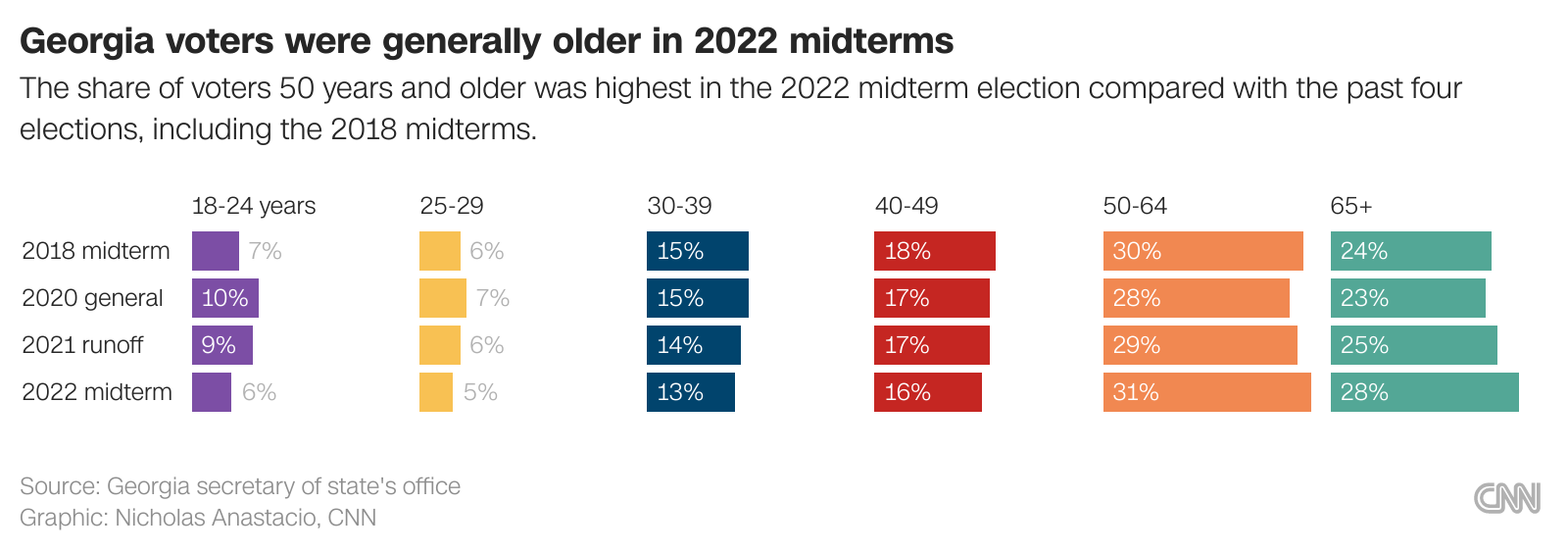
Exit polls show Warnock was able this year to sustain the improvements he made in the 2021 runoff election with the youngest voters and those in urban areas. He won 68% of the 18-24 vote in the 2021 runoff – a 16-point improvement over Democrats in the 2020 general election. He also won the support of 67% of urban voters in the 2021 runoff, 4 points more than Democrats’ share in 2020. Warnock won 69% of 18-24 year-olds and 68% of urban voters in last month’s general election.
Last month’s election was unusual in that more than 17,000 Georgians skipped the Senate race at the top of the ballot but did vote for governor.
“We aren’t entirely sure, but it is highly likely that those voters are probably Republicans,” said Amy Steigerwalt, a political science professor at Georgia State University.
There were also Kemp voters this year who crossed the aisle to vote for Warnock and then voted for the rest of the Republican ticket, Steigerwalt said. Kemp received 2.1 million votes, roughly 200,000 more than Republican challenger Herschel Walker.
The big question for this runoff is how Walker does when he runs on his own and without a chance of Republicans regaining control of the Senate, Abramowitz told CNN.
Trump will host virtual rally for Walker on eve of Senate runoff
From CNN’s Gabby Orr

Former President Donald Trump will host a “tele-rally” for GOP candidate Herschel Walker on the eve of the Georgia Republican’s runoff contest, according to a source involved in the planning.
The virtual rally, something Trump previously did for other 2022 midterm candidates, comes as the 2024 contender has kept his physical distance from Georgia in the lead up to the Dec. 6 runoff contest. Advisers to both Trump and Walker believed it would do more harm than good for the former president to hit the campaign trail for Walker, the same source said.
Trump also did not campaign for Walker ahead of the Nov. 8 midterm election, when the Republican Senate hopeful and his Democratic opponent Sen. Raphael Warnock both failed to cross the 50% threshold needed to avoid a runoff.
We’re one day away from the Georgia Senate runoff — here’s what you need to know about the race
From CNN’s Melissa Holzberg DePalo and Ethan Cohen
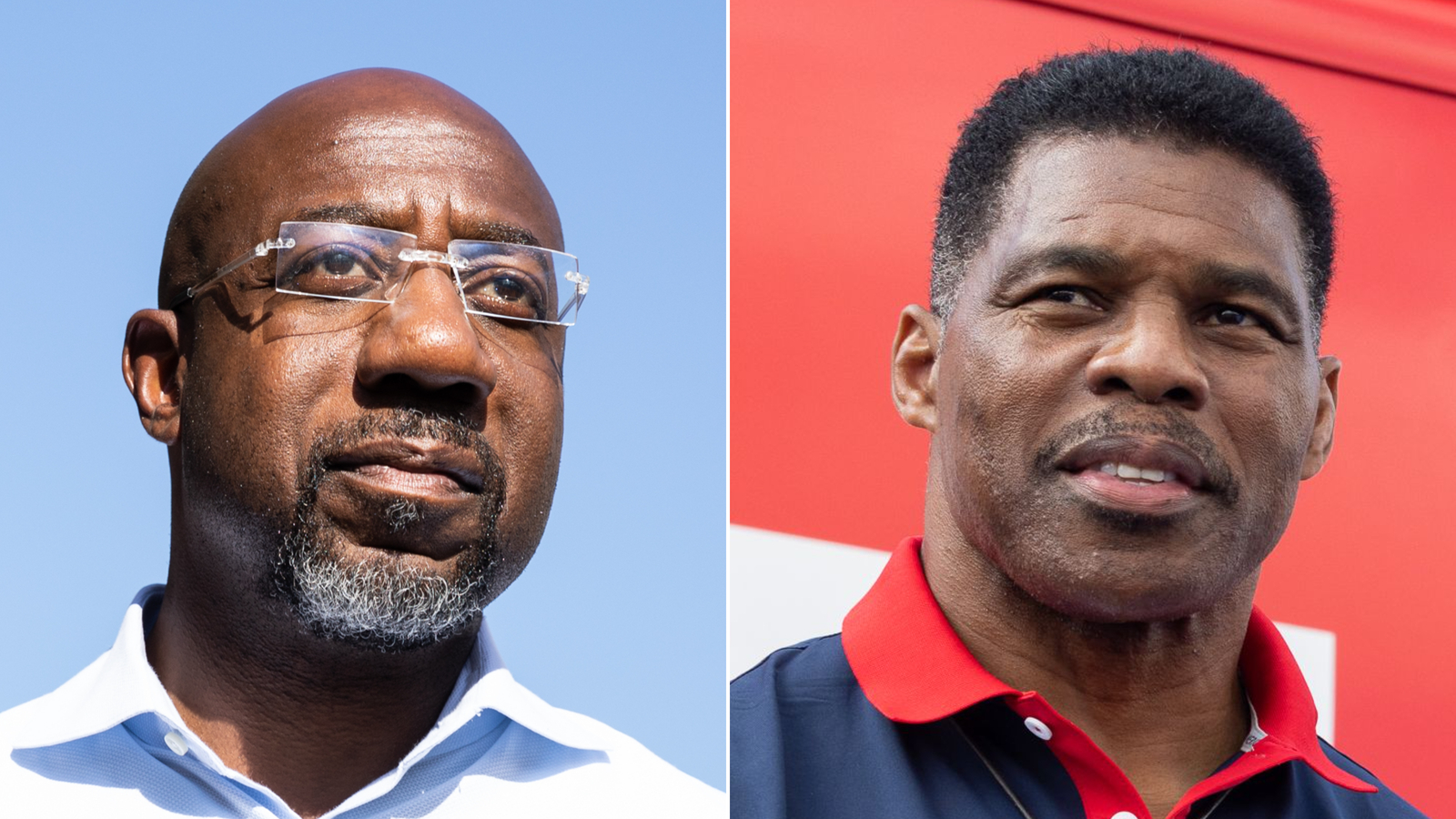
Georgia will host a Senate runoff election on Dec. 6 between Democratic Sen. Raphael Warnock and Republican Senate nominee Herschel Walker, a former football player.
Warnock and Walker first faced each other in the Nov. 8 general election, but neither of them received more than 50% of the vote, forcing a runoff election.
The candidates: This is Warnock’s fourth campaign in two years. He first ran in 2020 against appointed GOP Sen. Kelly Loeffler to finish former Sen. Johnny Isakson’s term. That race went to a runoff election in Jan. 2021 which Warnock won. Warnock and Democratic Georgia Sen. Jon Ossoff’s wins gave Democrats control of the Senate in 2021.
Republican football player Herschel Walker easily won the GOP nomination earlier this year. While Donald Trump’s endorsement helped Walker secure the nomination, the former president did not campaign for the former football star in the runoff amid concerns a visit could turn off independents and suburban women, critical voting blocs in the state.
What votes looked like on Nov. 8: In the November general election, Warnock led with 49.4% of the vote and Walker had 48.5%. The libertarian candidate, Chase Oliver, carried 2.1% of the vote.
Poll and voting information: Any registered voter can vote by mail or vote early in person. Voters did not have to participate in the November general election to participate in the runoff election. Polls open Tuesday at 7 a.m. ET and close at 7 p.m. ET. The last day to vote early was Friday.
Analysis: How Georgia’s looming Senate runoff election evokes America’s segregationist history
From CNN’s Brandon Tensley
Another year, another Georgia Senate race that’s headed to a runoff election.
Neither Democratic Sen. Raphael Warnock nor his Republican challenger Herschel Walker, a former football star, crossed the 50% threshold necessary to win outright in November. In consequence, they must battle at the polls on Tuesday.
But like last year’s races, the upcoming contest has sparked conversations about the troubling history of the runoff system, which some states began using in the final decades of the 19th century to quash Black political power.
Speaking with CNN, Gerald Griggs, the president of the Georgia NAACP, made plain some of his concerns about the state of voting rights ahead of next month’s runoff election.
In particular, he criticized SB 202, the wide-ranging elections law Georgia Republican Gov. Brian Kemp signed last year, after Democrats, propelled by Black voters, triumphed in both of the state’s US Senate runoff elections.
Racial justice advocates condemned the law, saying that certain elements of it target Black voters.
“(Georgia Republicans) shrunk the time for runoff campaigns (from nine weeks to four weeks). And voter registration for the runoff ended the day before the election,” Griggs explained. “These are attempts to condense the amount of time people have to vote, and thwart mobilization, especially mobilization of African American voters.”
He added, “Politicians need to speak to voters – not try to suppress them.”
To give a little bit more historical context to the runoff system, I spoke with Cal Jillson, a political science professor at Southern Methodist University, in Texas. Our conversation has been lightly edited for length and clarity.
What are the origins of runoff elections? The origins of runoff elections go back to the 19th century, when, particularly, they were used in the South. The idea was that the South was only one party, the Democratic Party. There was no effective, competitive second party.
Most of the states in the South decided that democracy among White men required having a majority to win an election. And since you didn’t have a natural two-party system that would produce a winner with 50%-plus-one of the vote, they had a first election in the Democratic primary and then a runoff if no one got 50% or more, so that the person who took office would’ve gotten a majority vote in that second election.
Read the full analysis here.
CNN’s latest poll shows Warnock holds a narrow edge over Walker in final undecided Senate contest
From CNN’s Jennifer Agiesta and Ariel Edwards-Levy
In the final undecided Senate contest of 2022, Democratic Sen. Raphael Warnock of Georgia holds a narrow lead over Republican challenger Herschel Walker among those likely to vote in a runoff election Tuesday, according to a new CNN Poll conducted by SSRS.
The survey shows that Walker faces widespread questions about his honesty and suffers from a negative favorability rating, while nearly half of those who back him say their vote is more about opposition to Warnock than support for Walker. Voters’ modestly more positive views of Warnock and a firmly committed base of supporters appear to boost the incumbent in the new poll.
Overall, 52% of likely voters say they plan to support Warnock in Tuesday’s runoff and 48% pick Walker. Partisans on both sides are deeply entrenched, with nearly all Democrats (99%) behind Warnock and 95% of Republicans backing Walker. Independents break in Warnock’s favor, 61% to 36%, but make up a relatively small slice of likely voters, 17%, compared with 24% in a CNN exit poll of voters in the first round of this contest last month. (Warnock finished narrowly ahead of Walker in November but without the majority of the vote needed to avoid a runoff.)
White voters remain broadly behind Walker ahead of Tuesday’s election: 69% support him, with 30% backing Warnock, in the new poll, while Black voters likely to cast a ballot next week are near unanimous in their support for the Democrat (96% Warnock to 3% Walker). Those divides are similar to the racial split in the 2021 runoff during which Warnock initially won his seat, when 93% of Black voters backed him while 71% of White voters favored his Republican opponent, then-Sen. Kelly Loeffler, according to CNN’s exit poll.
There is also a wide age gap in the upcoming contest, with voters under 35 sharply behind Warnock (74% to 25%), while those 65 or older break in Walker’s favor by 26 points (63% to 37%). Younger White voters are far more closely divided than older White voters (52% Walker to 48% Warnock among White voters younger than 45, while 75% of White voters age 45 or older say they back Walker). Support for Warnock is about the same among younger and older Black voters.
White voters without college degrees are heavily behind Walker – 83% support him – while White voters with four-year degrees are closely divided, 51% Walker to 47% Warnock. White women with degrees tilt toward Warnock (53% Warnock to 44% for Walker) while White men with degrees break in Walker’s favor (58% Walker to 42% Warnock).
Read more about the poll here.
Analysis: How Trump is helping Democratic Sen. Raphael Warnock in Georgia’s runoff
From CNN’s Harry Enten

Former President Donald Trump’s continued presence on the American political scene is one of the reasons Republicans underperformed in this year’s midterm elections. The former president’s debilitating effect on his party was perhaps no more evident than in Georgia, where Trump’s Republican nemesis Gov. Brian Kemp cruised to reelection, while his preferred Senate candidate, Herschel Walker, was forced into a runoff with Democratic Sen. Raphael Warnock.
Now with the Georgia Senate runoff just two days away, those problems are clearer than ever. Trump’s unpopularity in Georgia is causing him to stay out of the state in the campaign’s final days and is part of a deeper reshaping of political alignments in America.
To understand the Trump impact on Georgia, take a look at the CNN/SSRS poll of the Senate runoff released on Friday. Trump came in with a favorable rating of just 39% and an unfavorable rating of 54% among likely voters.
Of course, with Trump no longer president, you might think these numbers wouldn’t matter. After all, President Joe Biden isn’t significantly more popular in Georgia, with a favorable rating of 41% and an unfavorable rating of 52%, according to the CNN survey.
But when you break the poll down further, you see how Trump’s unpopularity is potentially keeping voters from casting a ballot for Walker. The former football star led Warnock by 87 points among voters who didn’t have a favorable view of Biden but had a favorable opinion of Trump.
That type of margin would have been more than enough for Walker to win, if it held among all voters who view Biden unfavorably. The problem for Walker is that voters who had a favorable opinion of Trump and not one of Biden made up only 37% of the electorate in our poll.
A sizable 21% of likely Georgia voters had a favorable view of neither Biden nor Trump. This group of voters still preferred Walker to Warnock, but only by 14 points.
So in other words, there was an over 70-point difference in Walker’s margin among those who didn’t like Biden, based on whether they liked Trump or not.
Warnock’s ability to keep Walker’s margins down among those who liked neither Biden nor Trump works for him mathematically because the poll found him leading by 100 points among the 40% of likely voters who just liked Biden.
To put in perspective how unusual it is for a former president to have such a strong effect, consider the last time there was an unpopular Republican president who had recently left the White House. In a September 2010 CNN pre-election poll, Republican House candidates were still winning voters who didn’t like George W. Bush (the former president) or Barack Obama (the the incumbent) by about 50 points.
If Walker was winning those who didn’t like Biden or Trump by 50 points, he’d be leading in our Georgia poll.
Keep reading here.
What we know about Georgia voters ahead of tomorrow’s Senate runoff
From CNN’s Christopher Hickey and Nicholas Anastacio
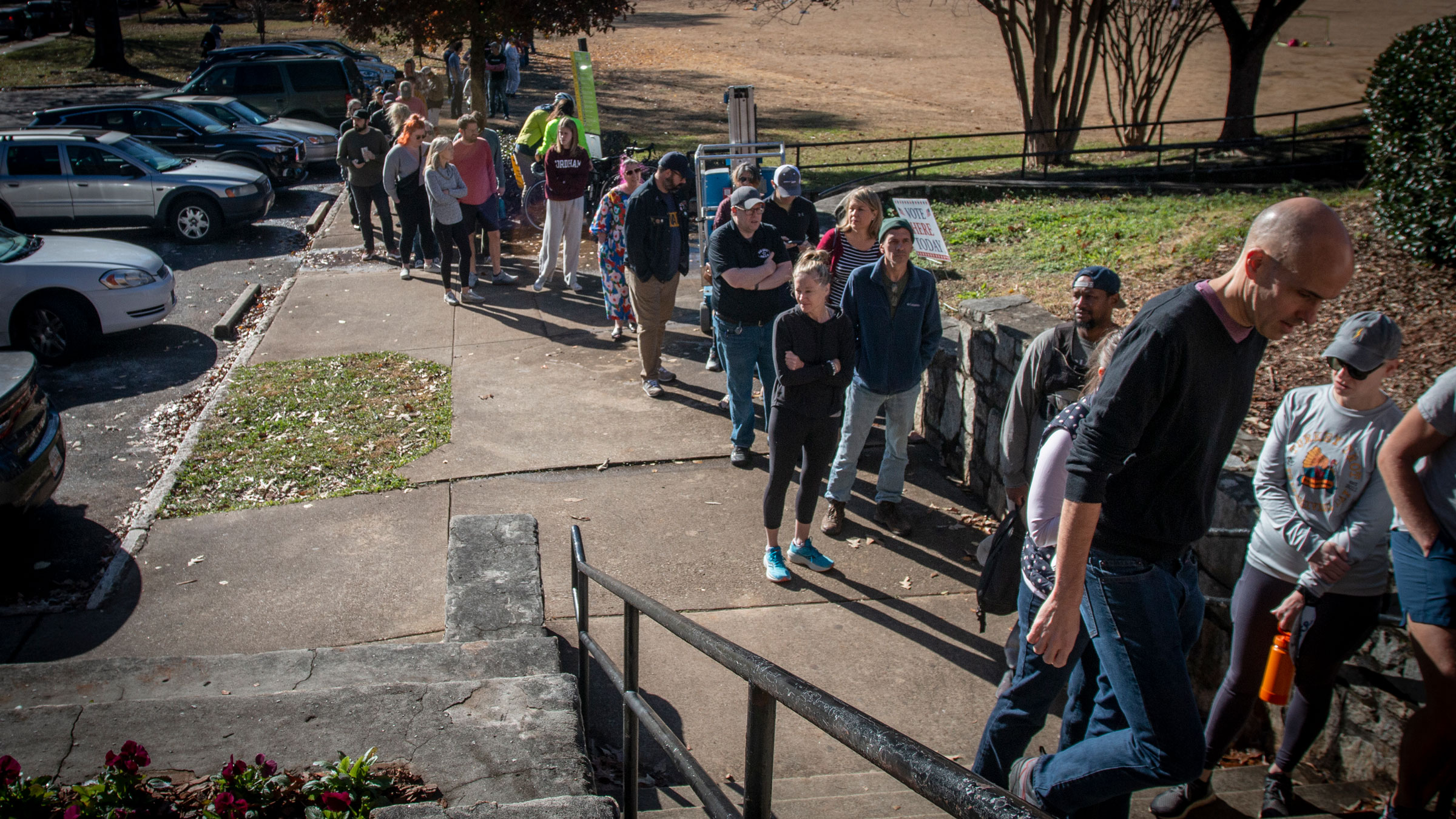
For the past two years, the eyes of the political world keep turning back to Georgia.
And for the second time in two years, voters in this key state will choose their senator in a runoff election, which this time will determine whether Democrats expand on their 50-50 majority.
Early data shows voters are not tired of their civic duty:
Heading into Tuesday’s Senate runoff between Democratic Sen. Raphael Warnock and Republican challenger Herschel Walker, more than 1.8 million Georgians have voted early after only about a week. Black voters have made up nearly a third of the early electorate so far, while more than a quarter of voters so far are under 50.
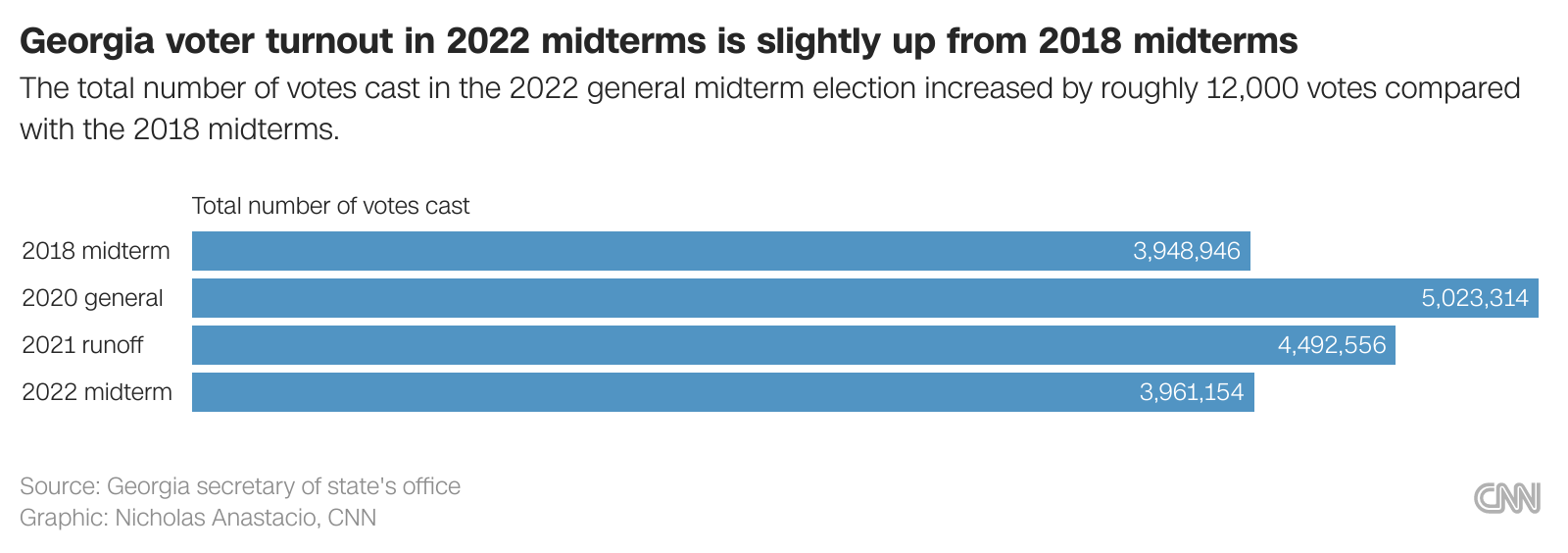
About 300,000 Georgians have voted early each day this week – setting records for the largest single-day early voting turnout in state history. Early voting for the runoff ended on Friday.
Georgians had only five mandatory days of early voting this year, compared with three weeks during the last runoff and for last month’s general election. All but 22 counties chose not to allow early voting last Saturday and Sunday as well.
Overall, 2022 midterm turnout was slightly up from the 2018 midterms but down more than 21% from the 2020 general election.
While midterm voters typically skew older and Whiter, turnout data from the Georgia secretary of state’s office shows that in 2022, midterm voters in Georgia were older and Whiter than they have been in the past four elections, including the 2018 midterms. Those voters tend to lean Republican. The fact that Warnock not only forced a runoff but also narrowly led Walker in the first round of voting last month suggests he had the support of independent and some Republican voters, political scientists told CNN.
“The key to Warnock was that according to the exit polls, he won the independent vote by a pretty big margin,” said Alan Abramowitz, a political scientist at Emory University in Atlanta. “And that was enough to pull him through. In the runoff, I think he’ll need to do that as well.”
CNN exit polls of Georgia voters in the November election show that the share of independent voters shrank 4 percentage points compared with 2020. However, independent voters were 24% of the electorate, which Warnock won by 11 points, according to CNN exit polls.
In Atlanta campaign event, Obama stressed importance of Georgia runoff for padding Democratic Senate majority
From CNN’s Gregory Krieg
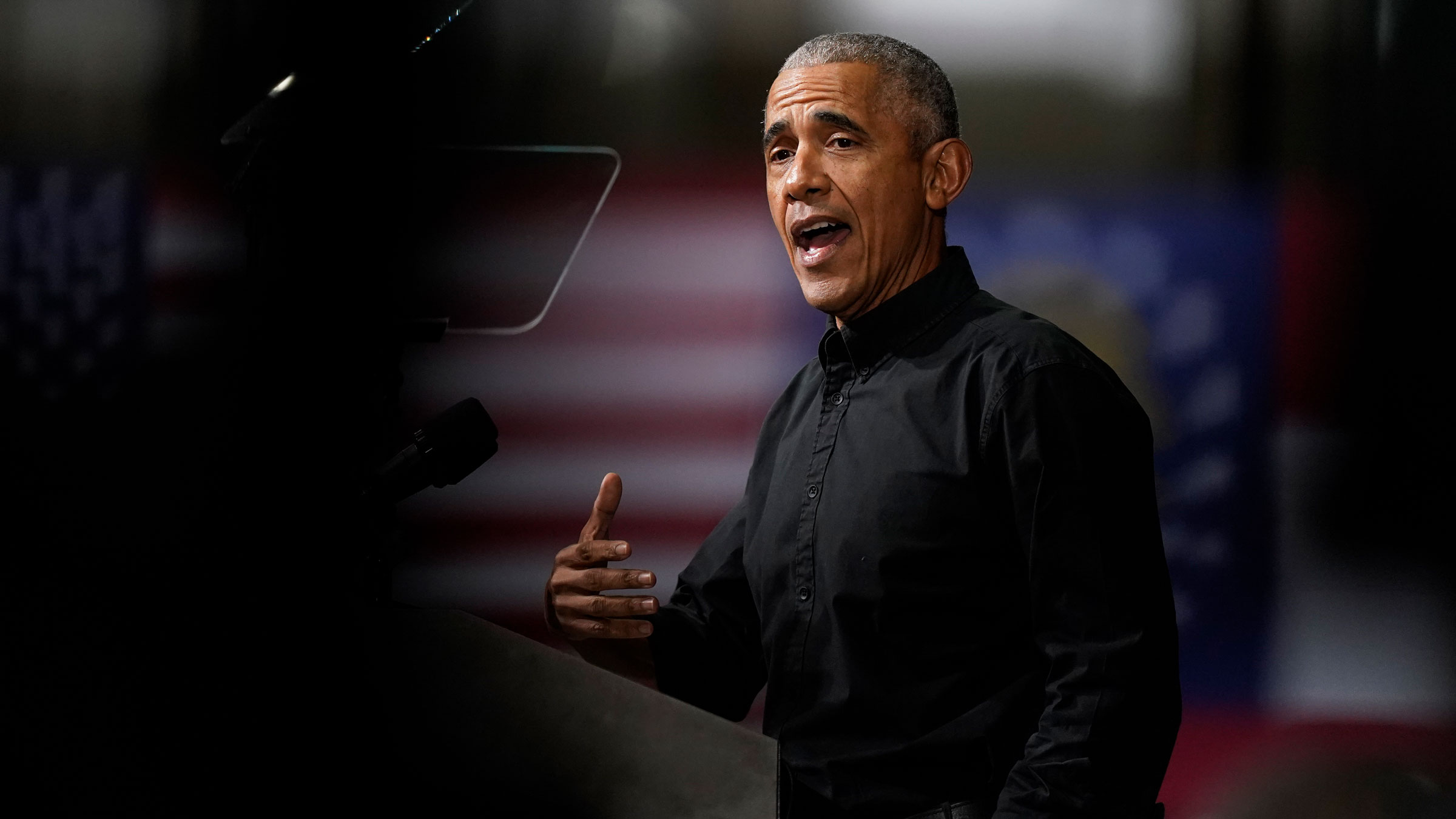
Former President Barack Obama last Thursday warned Democrats against becoming complacent in the final days of Georgia’s Senate runoff between Democratic Sen. Raphael Warnock and Republican challenger Herschel Walker, describing the GOP nominee as unfit to represent the state and stressing the value in adding a key vote to the slender Democratic Senate majority.
In his second visit to Atlanta during the campaign, having previously stumped for Warnock ahead of the Nov. 8 general election, Obama pushed back against any suggestion that the race had since diminished in importance. Warnock and Walker advanced to the Tuesday runoff after neither candidate received a majority of the vote last month, when Democrats held control of the Senate.
“What’s the difference between 50 and 51 (senators)?” Obama asked. “The answer is a lot.”
“An extra senator gives Democrats more breathing room on important bills. It prevents one person from holding up everything. It also puts us in a better position a couple years from now when you’ve got another election and the Senate map is going to be tilted in the favor of Republicans,” the former president said, warning that a potential future GOP supermajority could pass a federal abortion ban.
Obama’s visit came days before the end of a condensed runoff campaign of only four weeks – down from the nine the state previously mandated before the passage of a controversial voting law in 2021. He urged the audience not to become complacent, alternately praising the Democrat’s character and criticizing Walker’s assorted controversies and bizarre campaign trail rhetoric.
Obama’s presence, too, marked a stark difference between the two campaigns. While Democrats were able to call on Obama, a singularly popular figure within their party, to energize voters, the most popular figure among Republicans nationally, former President Donald Trump, has stayed away amid fears of alienating swing voters. (Democrats, though, have also been cautious in choosing surrogates: President Joe Biden has not appeared in Georgia, a state he very narrowly carried in 2020.)
Walker spent the night before the final day of early voting railing against Covid-19 restrictions and vaccine policies, while surrounded by Republican surrogates including South Carolina Sen. Lindsey Graham, Faith & Freedom Coalition Founder Ralph Reed and Rep.-elect John James of Michigan.
Obama said the Republican makes the case against himself “every time he opens his mouth.”
Read more about Obama’s campaign event in Atlanta here.
Source: https://www.cnn.com/politics/live-news/georgia-senate-race-12-05-22/index.html















